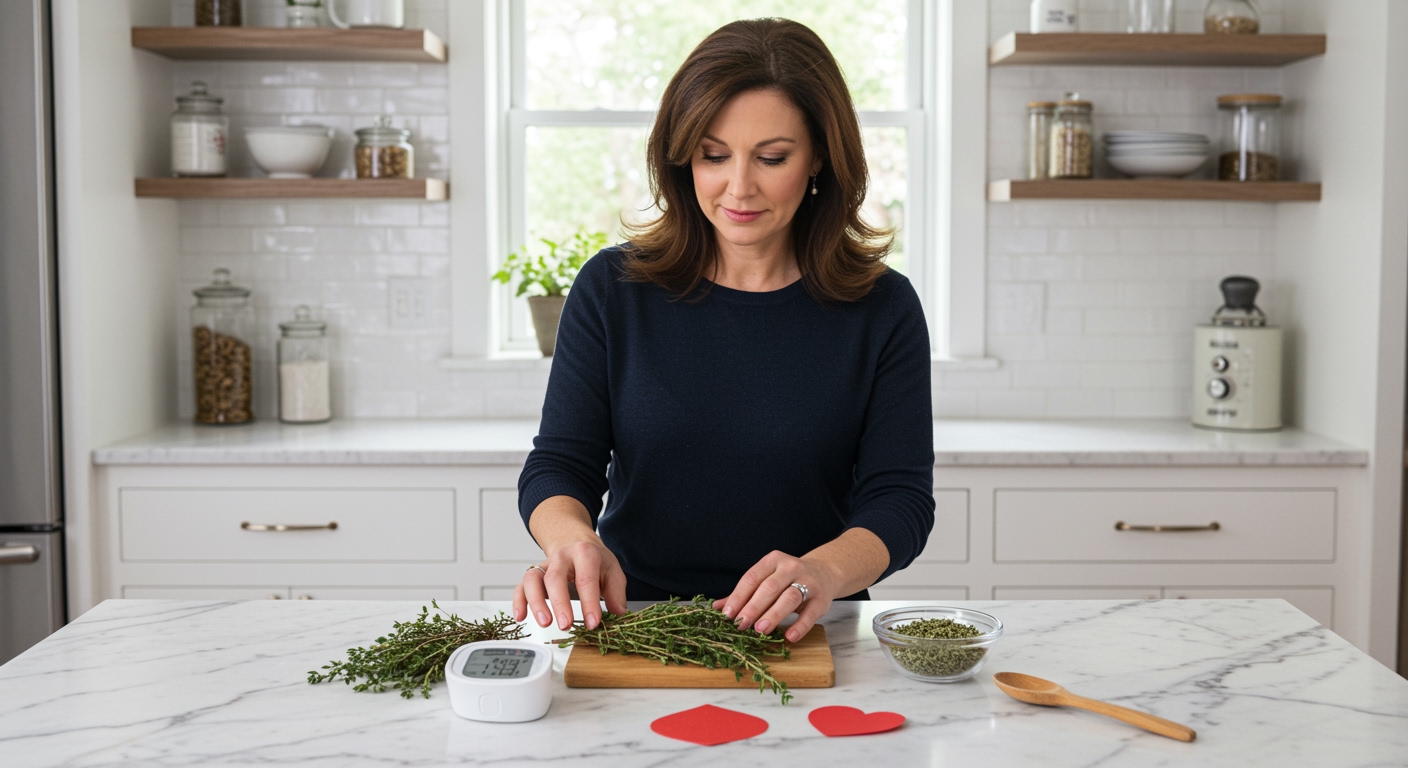✪ Key Takeaway: People with low blood pressure can safely use thyme in normal cooking amounts, but should avoid large medicinal doses.
Introduction
Your grandmother sprinkled thyme on roasted chicken without a second thought.
Now you have low blood pressure and wonder if this common herb could make your condition worse.
Hi, I’m Abdur, your nutrition coach and today I’m going to explain exactly how thyme affects your blood pressure and whether you need to worry about using it in your kitchen.
What Does Thyme Actually Do to Your Blood Pressure?
Thyme contains compounds called flavonoids and phenolic acids that can influence your cardiovascular system.
Research shows that thyme extract can cause mild vasodilation, which means it helps blood vessels relax and widen slightly.
When your blood vessels dilate, blood flows more easily through them.
This process typically leads to a small reduction in blood pressure readings.
The active compounds in thyme work by blocking calcium channels in your blood vessel walls.
However, the concentration of these compounds in regular cooking portions is extremely low compared to concentrated extracts used in studies.
✪ Fact: You would need to consume about 50 times the normal cooking amount of thyme to see significant blood pressure effects.
How Much Thyme Creates Problems for Low Blood Pressure?
Most people use about one teaspoon of dried thyme or a few fresh sprigs in their cooking.
This amount contains roughly 0.1 to 0.3 grams of the herb.
Studies showing blood pressure effects used concentrated extracts equivalent to 5-15 grams of fresh thyme.
That means you would need to eat massive amounts of thyme to experience any significant impact on your blood pressure.
The danger zone begins when people take thyme supplements or drink large amounts of concentrated thyme tea.
Some herbal preparations contain 500-1000mg of thyme extract per capsule, which equals about 10-20 teaspoons of dried herb.
If you already have hypotension and take these high doses, you could experience dizziness, fatigue, or fainting episodes.
✪ Pro Tip: Stick to culinary amounts of thyme and avoid concentrated supplements if you have low blood pressure.
What About Thyme Tea and Essential Oils?
Thyme tea concentrates the herb’s active compounds more than regular cooking methods.
One cup of strong thyme tea contains roughly the equivalent of 2-3 teaspoons of dried thyme.
While this amount is still relatively safe for most people with low blood pressure, drinking multiple cups daily could become problematic.
Thyme essential oil presents a much higher risk because it contains concentrated volatile compounds.
Even small amounts of thyme essential oil can have potent effects on your cardiovascular system.
Never consume thyme essential oil internally, and be cautious with topical applications if you have severe hypotension.
The compounds can absorb through your skin and potentially affect your blood pressure.
✪ Note: Limit thyme tea to one cup daily and avoid essential oil consumption entirely if you have hypotension.
When Should You Actually Worry About Thyme?
Your concern about thyme should increase if your systolic pressure consistently reads below 90 mmHg or your diastolic pressure stays under 60 mmHg.
People with severe hypotension who experience frequent dizziness, fainting, or fatigue should be more cautious with any blood pressure-lowering substances.
If you take medications for other conditions that can lower blood pressure, adding concentrated thyme products could create additive effects.
Common medications that interact this way include certain antidepressants, heart medications, and diuretics.
Watch for symptoms like increased dizziness, weakness, or feeling faint after consuming thyme products.
These signs suggest your blood pressure might be dropping too low from the combination of factors.
However, remember that normal cooking with thyme rarely causes these issues even in people with low blood pressure.
✪ Pro Tip: Monitor your symptoms when first adding thyme to your diet, especially if you take blood pressure medications.
The Bottom Line
You can safely enjoy thyme in your cooking even with low blood pressure, but avoid concentrated supplements and excessive amounts.
Smart nutrition means understanding the difference between food as medicine and food as nourishment – thyme in your kitchen belongs in the nourishment category for most people.
Share your experiences with herbs and blood pressure in the comments below, and let me know if you have any questions about managing your diet with hypotension.
References
At NutritionCrown, we use quality and credible sources to ensure our content is accurate and trustworthy. Below are the sources referenced in creating this article:
- PubMed: Thyme and cardiovascular effects research
- PMC: Herbal medicine and blood pressure
- Medical News Today: Thyme health benefits and uses
- Anadolu Medical Center: Thyme tea benefits and consumption





